SEO thrives in an environment of shared findings, hyphotheses, and tests, and my esteemed guest on today’s show has made it his mission to do just that.
Will Critchlow is CEO of SearchPilot, an enterprise SEO A/B testing platform that proves the value of SEO for the world’s biggest websites by empowering them to make agile changes and test their impact. Will was on the show back in 2018 and it’s great to have him on again to geek out on the science of SEO.
In addition to talking tech, we explore Will’s minor obsession with basketball (yes, they play basketball in the UK) – how it shaped his life path, and how it led him to invest in an app developed by one of his basketball buddies. Will discusses some of his favorite SEO resources, people he follows on Twitter, as well as conferences he has gotten a lot of value from, (shoutout to MOZcon). It’s fascinating to hear about the evolution of SearchPilot from the Distilled days, the powerful lessons learned along the way, not to mention how Will ruffled some feathers at Google!
So, without any further ado, on with the show!
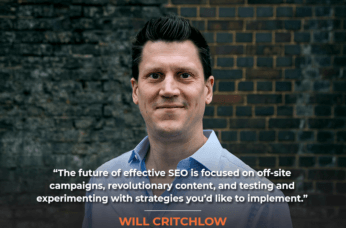
In This Episode
- [01:59] Will Critchlow talks about changes in his agency, including the spin-out of Distilled ODN into SearchPilot, which now operates independently.
- [07:09] What is the SearchLove conference all about?
- [14:14] Stephan shares his experience speaking at SMX Advanced.
- [19:56] Will recounts his experience winning their first big retained client in Distilled.
- [28:36] Stephan recounts a similar experience with Will when he started a web development company.
- [33:49] What is the future of SEO?
- [38:59] Stephan and Will discuss the movies and books they like the most.
- [51:01] How to prove the return on investment in SEO? What is the importance of avoiding negative SEO changes using the Pareto principle?
- [57:43] Will shares some SEO resources he loves.
Will, it’s so great to have you on the show.
It’s so great to be back. Thank you for having me on.
The last time you were on it was almost four years ago. A lot has changed in the SEO world. You had not sold Distilled at that time. Let’s catch people up on what’s changed for you, your previous agency, and the spin-out. What’s changed in the SEO world?
2018, at that time, what is now SearchPilot was a business unit within Distilled. It started as the R&D team. I had a couple of folks hacking away to see if we could solve the technical problems underpinning what would become the SearchPilot platform.
By 2018, we’d answer that question in the affirmative. We knew we could build this thing. We were trying to figure out the product/market opportunity, the product/market fit, the demand, and whether we could sell it to people. We had our first few customers.
Craig Bradford, previously our VP of London in the agency, had moved across to be VP running the business unit within Distilled. We started hiring some folks into the team, sometimes moving folks across. For example, people had been consultants in the agency world moving across to be professional services in the business unit.
2019 came the beginnings of the opportunity that ended up in the spin-out and the sale. It wasn’t something that we’d deliberately gone looking for. It was a one-off opportunity. It came up because Brainlabs had raised some private equity money. Brainlabs was, back then, mainly a PPC specialist agency, but now much broader across all kinds of channels.
SEO always had a culture of experimentation. Almost everyone in the industry is self-taught. Everybody had their playground, sandbox, or little websites they were trying stuff out on. Share on XI’ve known Dan Gilbert, the founder. Since he spoke at SearchLove, our conference four or five years before that, and also knew the private equity guys because I’d spoken to their portfolio companies. So there’s a whole load of threads of conference talks and all those kinds of bits and pieces. So I dropped down the line and said, congrats on the raise. I hope you’re going to do something fun with it. He said, “we’ve been thinking, one of the things we need to do is buy an SEO agency.”
From that conversation came the eventual transaction. It was complicated because we wanted to focus on the tech product and saw this opportunity there. But, of course, it was a tech startup at that stage. It was loss-making, it was very small, and it was very risky. It wasn’t the game that Brainlabs or their investors were in, but we devised a structure where we spun it out. The original shareholders of Distilled hung on to what became SearchPilot, and the agency and the conference became part of Brainlabs.
I have had this complicated bit for a while, where I was wearing too many hats. But, also, this ended up being right when COVID hit because the deal went through on the 31st of January 2020. So just as we were supposed to be moving into each other’s offices, the world changed.
The plan was I would do six months helping Brainlabs integrate the agency into their operations and then have an ongoing smaller obligation to support various things. However, I moved more over towards SearchPilot and ultimately ended up running SearchPilot, which we’re at now.
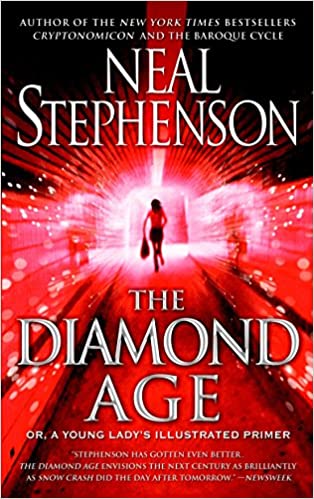
Broadly speaking, that plan worked out. It had some challenging moments when we were homeschooling and trying to work through the various crises that were going on in all the businesses for our customers and clients. So that was pretty intense in the first half of 2020, but that’s the part and summary.
That leads us to where we are today. The Distilled ODN (Optimization Delivery Network) business unit spun out and became SearchPilot. Today, SearchPilot is a standalone startup with 23 people between the UK and the US, mainly a couple of folks in Europe, and they are having a lot of fun.
That’s so cool. Congratulations. I’m happy for you. Are you still doing your earnouts, or is that part of the acquisition complete?
A slightly different structure for different shareholders. My particular structure was an equity-based one rather than an out one. I am still a shareholder in Brainlabs. I still am involved in various ways with that team, particularly supporting the conference side of things, and obviously, still with the SEO team and working with them there. Most of my working day, almost every day, is now SearchPilot-focused.
Let’s talk a little bit about SearchLove. That’s a cool conference. I have never attended it. I always wanted to but never participated. I would speak at many conferences, and I never managed to get in to speak at SearchLove, and I’m like, I’m not going to attend a conference that I’m not speaking at, which was my ego talking, of course. So whatever. You live and learn.
Anyway, SearchLove is a conference I’ve heard only good things about, and you’ve been doing that for many years. So please give our listeners an inside scoop on that conference.
We may have both been there in Seattle in 2008.
Yeah, I believe so.
The first conference we ran in London was a partnership with Moz. We co-marketed it. If I remember correctly, we took the ticket sales, and they took the digital sales in return for co-promoting the whole thing and co-branding it. The hilarious thing looking back is digital sales back then meant shipping people DVDs.
Yes, my session did make it on the DVD.
That was an operational and logistical nightmare for most teams who were not DVD production folks. Luckily, we just had to run a physical. We ran an event in London, and then they went towards running what became MozCon, and we separated ours, and SearchLove was born.

We also had a sister conference for a little while called LinkLove, which was a one-day event purely focused on link building in the heady days of link building. They were the most popular sessions at every conference, with link-building sessions. So we said, “hey, why don’t we run a pure link-building conference?” That was fun for a little bit, but it wasn’t sustainable.
Why wasn’t it?
Just like many link-building strategies, it became too divergent between some sessions that were just regular SEO sessions in many ways. There were three sessions. At LinkLove, you would get sessions that weren’t about link building. They were just about SEO. You’d get sessions about things that might get links, but they weren’t specifically links, so storytelling, content strategy, PR, or whatever else. And then you have this hardcore, often not completely white hat sessions.
There are some interesting anecdotes. I don’t know if enough time has passed to tell some of the stories of the trouble we got into with some of the less-than-white sessions at some of those events, but it wasn’t brand-aligned. It didn’t sit super well. We weren’t selling pure link-building services, so we said, you know what, let’s focus on the area we differentiated, which was technical SEO in particular and technical SEO and content with the bedrock of SearchLove.
You can’t just tease us and not hear something about the trouble you guys got into.

Okay. At the in-person events, we were good about disclaiming this stuff. So I would stand up, and people like Rand Fishkin would go. So we stand up, and there are certain tactics and approaches that we would use on our own business, that we would use for our clients, that we think is sustainable, and we’re going to have sessions about those. And then, I would introduce another speaker, saying, “this speaker is not that.”
This speaker believes in a different approach. In various cases, they may be churn and burn affiliate marketers. They’re the person you can go to and buy links from, whatever. The reason for learning from this person is not that you should be going out and approaching your corporate brand marketing this way. You’re going to meet this on the way. You’re going to have competitors who are doing this.
You’re going to need to know what those tactics look like. You will need to be able to diagnose what’s going on in the case of some negative SEO or whatever else. You might find some of these links pointing to your site. You need to know what they look like. You need to know where they come from. You need to understand how they operate.
To my mind, I’m intellectually curious. All of this stuff is fascinating to understand. We had some phenomenal sessions where people went into the nuts and bolts of the shadier end of link acquisition. What we missed was you can disclaim it in person as much as you like, but the folks tweeting about it, the disclaimer on every tweet, and the slide deck that the person presents don’t necessarily contain the release on every slide.
Somebody takes a photo of a particular slide, puts it on the Internet, or emails it to Matt Cutts.
There’s a story within Amazon that Jeff Bezos would escalate customer issues that came to him by forwarding them to the exec team member whose remit it was with just a question mark. So he would send a question mark. It meant dropping everything and fixing this.
We would get the equivalent of the question mark email from folks on the Google team. It only happened a couple of times. There was one particular incident, one of the best presentations in person, but taken out of context, I can see how it upset some people.
“Moneyball” is the future of SEO. The strategies that large websites will build upon in the future is a combination of winning tests. Those are our dunks and layups, and we're sure to make those shots. Share on XVarious people around the industry thought we were promoting one thing on our website, where we said, this is how we operate. These are the services we sell to our clients. In practice, we’re doing something completely different, which wasn’t true. We just had those folks speaking at a conference.
I stand by it. I learned a lot from those individuals and those talks. All marketers need to know what nefarious tactics might be used against them. It doesn’t mean I’d ever use it on my or a client’s websites. But yeah, we certainly had some little run-ins.
I had some run-ins myself, and I’ll share one. I spoke at the first SMX Advanced. I pitched the session topic or give it up, share your most secret favorite ninja hacks that nobody else knows. Dan Sullivan loved that idea. Rand and I were the panelists.
Because I was on that panel with Rand, he was impressed with the ninja stuff I shared. A few weeks later, we ran into each other again at SCS Toronto in the speaker room. He came up and hugged me. I had never spoken to him really before that. He’s like, “dude, you brought it. That was amazing at the SMX advanced to give it a panel.”
We had a great conversation. In that conversation, we decided to do a book together. By the end of our discussion, we already had a publisher because it just so happened that Dan Sullivan was at O’Reilly’s Foo Camp right at that very moment. There are no coincidences. I know that now. But at the time, I didn’t. I had no clue.
Put this energy out there.

I’m like, “oh, I’m so lucky.” “No, it was meant to be.” That turned into The Art of SEO, and Jessie Stricchiola and Eric Enge are onboard as co-authors. It’s been a career-changing book for all of us. It all came about because I was forthcoming with what I’d figured out. I would ask the audience, does anyone know this? One or two hands would come up, and I thought, they’re full of it. They never thought of this.
On the flip side, I gave three talks at that conference, and one was on link building. I was sharing some also very ninja stuff, really creative, but maybe with gray hat, definitely gray hat stuff. Not that I was doing it, but this is cutting-edge stuff. I’m so clever for figuring this out. That was my ego talking, of course.
Of course, Google engineers were in the room. I remember someone came up to me afterward, a little bit later in the event, and said, “that was not good, Stephan. If we were about to have you come, speak, and do a training, and we would record it, you would have been one of our trusted SEO experts, and you just blew it. I was devastated, to be honest.”
I hate that. Years have gone by in particular. It happens less these days, but it has become personal too often. The weird thing for me, I remember it may have even been the same event. I remember there was a panel that comprised a bunch of folks talking blackhat stuff. Matt Cutts was there.
I remember specifically who was on that panel. I remember three of them. I remember somebody described something. Matt’s saying, don’t do that. We’ll ban you if you do that. So the first speaker says, “you find it, you can ban it.” I remember that line.
That was the giggling, and it was a game. It was fun. He’s writing down in his little notebook who’s doing what.
Marketers should learn the nefarious SEO tactics that might be used against them. It's vital to understand how to protect your site from negative SEO. Share on XRuin this guy’s life. That was what he’s written in the notebook.
Yeah, but the web is a big place. There was an update on their primary website, the spinning up affiliate sites and whatever else. He’s like, “if you can find it, you can ban it.” I remember that line. It was a game of cat and mouse, in the way it was being portrayed and the way it was on stage.
Yeah, there were folks like you, by the sounds of things, who are doing something right, then giving one talk, and then getting somehow delisted not from the web but from a speaking opportunity or whatever else. So, yeah, that never sat right with me in the way that they played some of those games.
Not for me, either. Everything happens for a reason. But, again, I didn’t realize that at the time. I was still agnostic up until 2012. After that, I just thought, yeah, this sucks. This is an unfortunate turn of events, but I wasn’t meant to be Google’s poster boy. It’s all good. It all unfolded perfectly. I’m grateful for all of it.
Do you have any examples where in retrospect, you can connect the dots backward but not forwards, like, “oh, I see how that did serve me even though it was an absolute show at the time?”
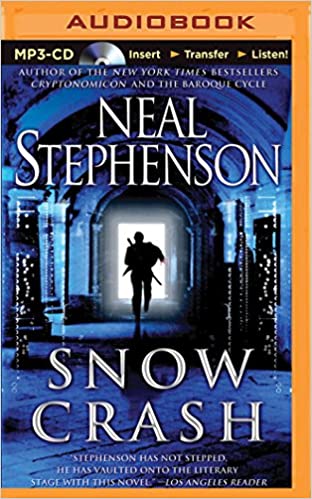
Not in quite the same way. I have some coincidences or bits of serendipity. We had won our first big retained client in Distilled. Distilled started building websites, and that was very much project-based work. Next, we started doing SEO work, but again, it was project-based SEO work.
Some of those have got to be reasonable-sized projects. That was very much how Moz used to work. SEO Moz used to work in the consulting days and used to sell projects rather than retainers. So we would work with them on some of those.
Closing this deal involved an hour-long phone call to Spain. It was a Pan-European hotel chain. An hour-long phone call on a mobile phone to Spain back then cost a lot of money, and I didn’t have much money then. So I was like, “I hope this client signs because this is worth it because the retainer was roughly the size of our biggest project to date, a month.” So this is worth it as long as it closes. If it doesn’t close, I will be very upset about how many £100 phone bills I will receive.
Luckily, it did close. We worked with them for years, but it involved travel to Spain, which was also great. Most of us would go in the small team from time to time. My brother, Duncan Morris, my co-founder, and a few other folks would make this trip to Madrid, where the client was. We had a great time.
The funny thing was that on one of these trips, my brother fell asleep on the plane, and I took a silly photo of him. I wrote a blog post about our trip. I included this photo of my brother asleep on the plane, looking like his hair was everywhere. Then I mirrored the image, had him facing the other way, and pretended it was a photo I’d taken on the way back. It’s just a stupid joke.
We had a whole like, is this too silly? Is this not professional enough? Should we be putting this kind of content on the blog kind of conversation? The serendipitous moment was that I found out years later that shortly after that, we won a project with Amazon, an SEO project, where they were bringing US-based folks over to the UK. At that point, unbelievably, they still didn’t have a UK-based SEO team in-house.
Some US folks were coming over and wanted the inside scoop on how the UK SEO market and organic search opportunities differed from the US market. We were perfectly positioned for this because, at this point, we’ve been working US and UK, but we were based in the UK. So we knew the UK inside out, but where it was different from the US market.
You will struggle over time if you don't constantly create new content. It may seem difficult but it’s worth it for valuable and positive SEO optimization. Share on XWe won this really interesting project. I found out years later I ended up good friends with the point of contact, the lady who’d come over to the UK. She said, “you know the reason we gave you that project? You made me laugh with that stupid blog post of your brother falling asleep on a plane to Spain.”
Whoever else they were talking to has done the whole buttoned-up professional thing. She said, “you guys seemed more fun to work with, so I ended up working with you instead.” It wasn’t a huge financial deal for us. It wasn’t a massive project. But having that name on our company resume and being able to use her as a reference when we were pitching new clients was huge.
That’s awesome. Thanks for sharing that. We get this intuitive feeling. Screw it. I’m just going to do it. I’m going to take that risk, or I’m going to turn left today instead of right like I normally do, and magic happens.
Stuff happens, yeah.
It’s all by design. Moz thinks it’s a simulation by advanced humans that we live in, but it’s different.
If it is a simulation, it could also be a simulation in a simulation. So it’s just turtles the whole way down.
Yeah, it’s an illusionary reality.
It feels real.

Yeah, it feels very real. It feels very real until you start getting signs that it’s not. Then, the glitches in the matrix start happening, which blows the doors open to all sorts of craziness, which is beautiful and amazing. I can understand now as a non-agnostic. I could not relate to people like I found God, or I had an awakening or whatever. I was the worst skeptic and cynic. I was a cynic.
I’m still on the other side of that vibe. I don’t feel cynical about it or skeptical about it. I have no idea about the bigger picture. I think about religion and that whole side of things, spirituality, similar to how I feel about politics: I don’t know the answers to most of these questions.
People have such strong opinions on stuff. I’m like, “I have no idea.” Even things that I strongly believe about, when I dig into it, I’m like, I don’t know. So, yeah, I’m much more agnostic than atheist. It’s the fairest way to put it.
Yeah, I could relate to that until I went to India in 2012 and got touched on the head by a monk. I had a psychedelic trip, essentially, and felt so connected to God and everything that is. Everything was technicolor, like a cartoon, and all these outlandish miracles started happening. You couldn’t make this stuff up. It was just so outlandish.
I was at an event a few months later. I’m just blissed out laying on the floor after getting an entrainment, like an energy-healing technique. I started praying for people I didn’t like, sending them blessings.
One of these guys that I prayed for, I hadn’t heard from for many years, probably 15 years. He used to work for me. He was talking smack about me behind my back. My ego did not like that because he was talking to other staff. I caught wind of it.
I made an example of him. I marched him off the premises and fired him. He had the little box of his things to take off the property. That was not cool of me. Anyway, he filed a frivolous lawsuit against me for wrongful dismissal. It was a work-at-will state. I could fire him for wearing nonmatching socks. But it was cheaper to settle than to win.
Eventually, I did, and he disappeared from the earth for fifteen years. I never saw him again. I heard his name, but nothing. It’s like he disappeared and then pops into my mind while I’m blissed out lying on the floor. And then, who calls me out of the blue four days later? That guy, to apologize. That’s pretty wild.

That’s incredible. I love it.
It is fun. I got so many of these kinds of stories. This is a marketing show, so let’s return to marketing. It’s quite fun to have these things happen, and, in retrospect, it fits. These were exactly the right puzzle pieces to complete that puzzle.
An example that dovetails or has some similarities with your story is that I started Netconcepts as a web development company. We built project-based websites, of course, and then we started getting into SEO and optimizing the site’s search engine. And then, we started taking on SEO retainer engagements. One of the first SEO-specific engagements that didn’t involve a web development component was an SEO audit we did for free for target.com.
You talked about the power of having the name Amazon, using their logo on your client list, and having them as a reference. We did the audit for free in exchange for using their logo, a testimonial, and being able to include them on our list of references. It changed the entire business.
I can imagine. That’s hard to sell because it’s often not about the money. They’ll still say no to the logo or the reference.
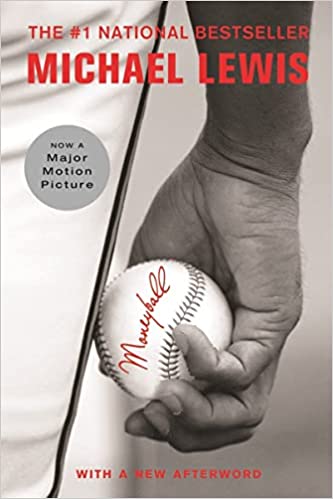
Yeah, that’s cool. In retrospect, it was all meant to be. I can see that now, but it wasn’t clear. I just thought, wow, we lucked out. That was so lucky. How did we get that? I can’t even believe it.
Of course, you have to do the work. You can’t just rest on your laurels. The Law of Attraction isn’t just thinking positive things; the checks arrive in the mail. That’s part of it.
You got to do the work, yeah.
You got to get out there in the world. That was fun. Also, another parallel between your company and your story was inventing a SaaS platform because we were running up against problems with our client engagements where we couldn’t get stuff implemented.
I remember, yeah. You were doing what we did today decades ago.
Almost two decades ago, yeah.
Yeah, but the rise of the cloud has been one of the things that have enabled us to build the platform we have. If I remember correctly, I can’t imagine you’re doing it literally in the rack and data center.
Yeah. The client must install proxy-based rewrite rules into their Apache Server Configuration File.
Pretty intense. I do remember those days.
GravityStream was the technology. The serendipity of things just led me to this flash of insight working on a particular client engagement. Two were Kohl’s department stores, and the other was Northern Tool. Between the two of them, GravityStream was born.
That was amazing because that changed my whole life at the time. I could sell the company because of that technology because just an agency by itself in those days wasn’t that compelling of an acquisition, but a SaaS platform. That was the majority of our revenue, not the consulting services. So it was just an appealing acquisition. Fun times.
What’s on the horizon for you and SEO? You’re beavering away at SearchPilot’s doing enterprise SEO testing, but what’s on the horizon? What’s new? What’s exciting you? How will you seize new opportunities that others don’t even know exist?
Including a description in a webpage’s alt attribute can be considered a ranking factor in technical terms.
We still feel like we’re early here. On the one hand, yes, we’ve been doing this for years. We talked about it on the podcast four years ago. So we’d already been doing it for a few years. But, on the other hand, we’re still in the foothills of SEO testing, especially on large websites.
SEOs have always had an experimentation culture. All of us are self-taught, especially if you go back far enough. There’s nobody to learn from. Everybody had their playground, sandbox, or little websites they were trying stuff out on.
You go back and read old blog posts from folks that I’ve been around the industry long enough, and everybody’s talking about the tests they’ve run or the experiments they’ve done and those kinds of things. But all of those tended to be lab experiments, what we call laboratory experiments.
In other words, something is technically a ranking factor by putting something in the alt attribute on a page. However, it’s a made-up word, and nothing else ranks for that word. You see if it ranks when it’s included, for example. Those kinds of experiments are interesting. I certainly am a sucker for them.
I will read any that anybody wants to send me, but they don’t connect to business metrics. They don’t tell you if you’re going to rank. They don’t tell you if you will do well in competitive markets. They don’t tell you if it will move the needle when it’s not a made-up word.
The testing we do, where it’s controlled scientific experiments on real pages that are making money, it’s such early days. So few people are doing that properly. What’s the future? Our biggest job is getting more folks excited about this being the way of the future and the way to do the work.
The way that onsite SEO, in my opinion, needs to move is as Google becomes an increasingly more black box, increasingly more machine learning-powered, increasingly more domain-specific—I don’t mean URL-specific, I mean industry-specific or keyword area–specific—the ability to make best practice changes and have them have an ROI will diminish, and diminish, and diminish. So to stand out in those competitive spaces, you need to find the way through.
Learning from those with differing approaches doesn’t mean you should adopt their tactics, but rather understand them to navigate the competitive landscape better.
We talked about this by email. I gave a talk at MozCon this year entitled SEO Moneyball. The brief was to talk about the future of SEO. The angle I came up with was an idea that had been bubbling around in my mind for quite a long time. Partly, it was an opportunity to discuss two things I wanted to geek out on SEO and basketball.
Moneyball was first made famous on the baseball side. But all pro sports these days have their Moneyball angle, which is the idea that you apply big data and data science, machine learning, and so forth to the data, you can generate now. As a result, you can get insights that haven’t been available to managers and coaches in years. So you find these slightly counterintuitive things that do work in different situations.
Not to go too far down the sports route, although I’m happy to discuss that anytime. The SEO angle I came to was to draw the analogy from basketball. The big Moneyball realization in basketball was quite how valuable the three-point shot is and quite how (relatively speaking) dangerous the mid-range jump shot is because it’s almost as hard as the three-point shot but worth less. The three-point shot’s worth 50% more.
We should put a striking shot-shot in the notes that show 20 years ago, professional basketball players taking shots from all over the court. Today, it’s clustered outside the three-point arc and around the rim. Then, it’s dunks, layups, and three-point shots.
My argument was that the future of SEO is the same bifurcation, where the mid-range that we need to cut out is the untested onsite tweaks that are the optimizations but where we can’t test them, which are as likely to be positive as negative, as likely to be pointless (actually) and still take the effort. So we cut out that mid-range. The dunks and the layups are the tested onsite changes we’re discussing. And then, the three-point shots are the production of new content.
The future of an effective enterprise SEO program is focused on off-site stuff, new content, and testing the optimizations that you want to make. That’s, we’re in the foothills. This thing has legs. Many years of growth are left in this because very few teams are doing this effectively now.
I loved that post you wrote. That spurred me to contact you and say, “hey, it’s been four years. You got to come back on the show.” I loved that post. I love the movie Moneyball, and I just loved your analysis.
I love the book. Have you read Michael Lewis‘ book? Before it was a movie, it was a book by Michael Lewis. He’s just a phenomenally engaging author. There’s a whole other rabbit hole we could go down. I disagree with the entire premise of Flash Boys, one of his more recent books. We can have that argument one day, but his book is about sports, so Blind Side and Moneyball are both great.
Blind Side, yeah, that’s a great movie too.
And also a great book. I’d recommend them.
I loved the movie Ready Player One. But until I read the book or listened to the audiobook, I was like, “wow, that is ten times better than the movie.”
I haven’t seen the movie. However, I did read the book.
Did you love the book?
I enjoyed the book. I didn’t fall in love with it. I know some people rave about it. I enjoyed it, but I didn’t become a passionate fan.
Okay. You’re a bit younger than me, almost a decade younger. Did you play with Atari? Were you into that sort of stuff when you were a kid?
I have that cultural memory. I did a bit, but I was never much of a gamer. So it’s a slight mismatch of my cultural enjoyment. For many of the references, I used to have a ZX Spectrum back in the day. We had an Amiga, and my friends had Atari.
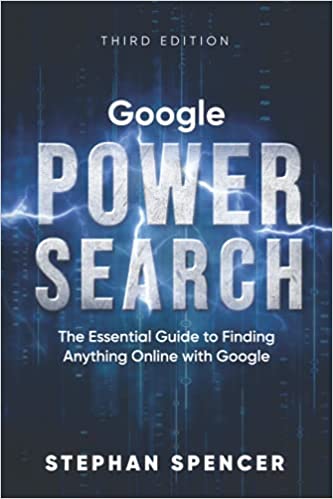
The thing I remember about that was its motion graphics programs. I remember you could animate things and describe how you wanted them to move across the screen in such intuitive ways. I’ve never seen an animation program as powerful as some of this stuff we did in the late 80s or early 90s. Unfortunately, I don’t remember it. It must be in the early 90s, pre-internet for me or pre-web. The cultural references made sense, but I am not much of a gamer.
I’m not a gamer either, but I did play games and program games. I wrote my Bulletin Board System from scratch in BASIC and taught myself Assembly language and stuff when I was a kid. It was an appealing listen since I didn’t read it. But my favorite books, again, you could listen to the audio, audible version if you don’t have the time to read. One is called Snow Crash, the other is called The Diamond Age, and they’re both by Neal Stephenson.
I haven’t read either, but I’m familiar with Stephenson. Snow Crash is the one that I’ve heard recommended many times.
The Diamond Age is more futuristic and will give you more of a leg-up on the competition regarding how different the world will be when molecular nanotechnology is here.
I’m going to have to check that out. I haven’t heard of that one.
I heard about it first from Steve Jurvetson and Draper Fisher Jurvetson. Do you know the VC firm that gave Hotmail their round of funding? Steve Jurvetson is a multi-billionaire. He mentioned many years ago at a conference that his favorite book was The Diamond Age.
Interesting.
I recommend it. You’ll like it.
Okay. Nice, thank you.
We’ll also include a link to that blog post about Moneyball and SEO. I’m curious about our listener who’s unfamiliar with basketball, the mid-range shots, and all that. Why is this no longer a thing? Why are mid-range shots no longer happening in professional basketball?
The crucial aspect that needs to be eliminated is the untested onsite modifications that aim to optimize a website but cannot be properly evaluated.
The quick answer is that the mid-range is all the shots that are further away from the rim than a layup or a dunk but are not outside the three-point line. They’re worth two points. When you look at the statistics, they are much harder than people realize. It took bigger data for people to learn how hard those shots are. People had always thought you miss them because you’re guarded, but when you broke down all the confounding data.
The upshot is basically if you are going to come inside the three-point range, and otherwise, you’re going to take a two-point shot, you ought to go all the way to the rim because you have a better chance of scoring. If you’re going to step out and take a jump shot, you should step out further and take a three-point shot and get more points for it. Although a slightly lower percentage, it makes up for it and is worth more points.
Now, the confounding thing is that every time I talk about this, basketball geeks tell me that the mid-range is not dead, and that’s true. I know this. It is fascinating.
I nearly went there. I almost extended the SEO analogy into this, and I thought, no, this is too far. You’re going too far down the rabbit hole. Step back. What it turns out is that there’s an elite class of players. It’s like DeMar DeRozan, Kevin Durant, and CP3. There’s a handful of them around the league who are incredibly efficient at the mid-range jump shot. They are still doing the mid-range work for them. They’re still taking it, it’s working, they should take it, and it’s great.
It’s also true in Sunday pick-up basketball that you must take the mid-range. Not everybody should be jacking up three-point shots because your percentage is—spoiler alert—not up there with the elite NBA Gods, three-point shooting center, so I need to take the mid-range.
That’s one of the few things I have in common with DeMar DeRozan, who also should take the mid-range. But what remains true is that, on average, when you look across the league, the percentage of shots taken from the mid-range has dropped precipitously since the early 2000s.
And that’s because of all the available statistical analysis, data, and ways of slicing and dicing.
They have cameras in every arena now, dozens and dozens of cameras tracking everything, all players, the ball, and every movement. So that isn’t that hard having the cameras. But the analysis that the computer is now able to do, then they can in real-time automatically—machine learning—classify what the move was, who was defending them at the time, all of these kinds of things.
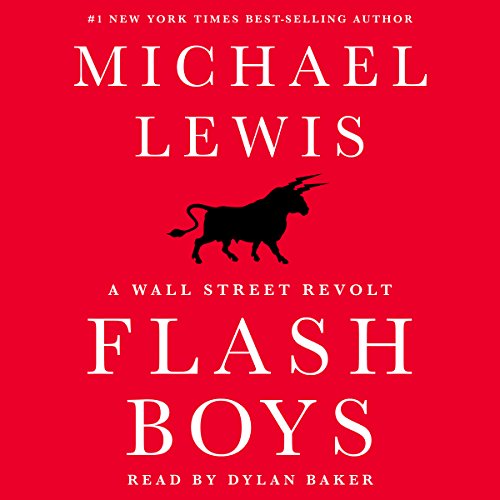
The coaching staff can say almost like a SQL query for the tech geeks. It’s like, show me every time that this player was guarded by that player, took their first dribble left, took a right-handed pull-up jump shot, and missed. The system can say, “here are 15 videos for you to see every time that player has done that and had this outcome.” Just a coaching tool, never mind the statistical analysis. The coaching tool is phenomenal.
I’m an investor in an app called TeamSportz, founded by a guy I play with, who is applying all this machine learning tech to the more consumer end of the market. Not just the proteins, but my basketball team can have this stuff.
What they can do with machine learning models on the phone these days is incredible. You film with a phone camera, and it can classify ball movement, exercise movement, and all these kinds of stuff. So talking about the future, there will be incredible breakthroughs in all those areas.
Yeah, that’s fun. I didn’t think that people in the UK were into basketball. I thought they were into cricket and rugby.
Absolutely. It’s very much a big fish in a small pond. If you play a sport that not many other people play, you can play it to a higher level. That’s my pro tip for a teenager. Play basketball in the UK and soccer in the US because you’ll get to play at a higher level. It was just a weird thing.
The head of sport at my high school, what we call the high school—runs from age 11 all the way through to 18—was a basketball player. I don’t know why he was, but he was a basketball player. Every school has the one sport that gets all of the attention, all of the resources, all of the practice time, whatever it might be. That was basketball, which was unusual. It’s where and when I grew up, but it just led to who will be interested in basketball.
It led you to become an investor in that TeamSportz app. All this cool analysis, Moneyball-related type analysis and stuff that wouldn’t have happened if you didn’t have serendipity. Or that one was synchronicity. That this guy coaching your teams, there was really into basketball.
Many people have the influence of somebody from their youth.
Many people have the influence of somebody from their youth. That guy was called Gordon Meadows. He died a few years ago, unfortunately, far too young. But, he greatly impacted my life, from the love of basketball and because he leveraged that.
I remember one day, he walked past. He saw me standing outside the classroom because I’d been thrown out of a math lesson for not paying attention and talking too much.
You’re a troublemaker. I can see why Google would lay its finger on you.
This is the only time. I was not. I was a massive geek in school, and I still am. He walked past me, saw me standing in the corridor, and said, “Critchlow, what are you doing?” I said, “I’ve been thrown out of the lesson, sir.” He said, “if that happens again, you’re getting cut. That never happened again. He had a big influence.
I got to play with him as a peer. We played in the men’s league when we were finishing school, ages 17-18, and he was still just playing. He must have been in his late 40s or early 50s and still playing. So I played with him as a peer for a while. Unfortunately, he died recently, but he had a big impact.
That’s cool. Thanks for sharing. Now, I’d like to hear if you get the questions from prospects, as I sometimes do, of how do you prove or at least cost-justify my spending or investment in your company’s services, tools, or whatever? Trying to prove ROI on SEO is very hard. But, unlike with pay-per-click, it’s a lot easier. What’s your answer to that one?
We get asked all the time. It’s also basically our mission. This is what we’re doing. There’s a three-pronged answer for SearchPilot. The easiest and most intuitive part is you’ll get some winning tests. You’ll run these tests and know how much of an uplift that effort and investment have driven. Finally, you can quantify that in increased organic traffic and revenue.
We might all be arrogant in SEO because none of our ideas are bad. None of our recommendations would cause damage to your website.
We have technology that we call full funnel testing, which takes from improving search visibility to conversion rate. You can measure with a single test the bottom-line impact, the actual top-line impact, and the revenue impact of the initiative. That’s the easy one. But, of course, you’d have made some of those changes anyway. So there are some subtleties in there.
The next piece of the puzzle is we will help you avoid deploying changes that would be detrimental to your performance. That is huge. Some of the biggest ROI that many of our customers get is never again deploying a negative SEO change.
We might all be arrogant in the SEO world. However, none of our ideas are bad. None of my recommendations would cause damage to your website. Still, we now have hundreds of tests that show perfectly common SEO recommendations, like taking a piece of keyword research and implementing updated title tags as a result of the study.
Being very, very sensitive to exact phrasing, for all kinds of obvious reasons, affects click-through rate, affects ranking, affects all sorts of things, and far too often, having those changes be not only negative but sometimes catastrophically negative, -20%, -30%, sometimes in organic traffic.
I wrote a post called Marginal Losses. There’s a concept in marginal gains: if you increment 1%, gain, after 1%, gain, after 1% gain, you double in a year or whatever the stat is. Marginal losses are the opposite. If you deploy many small negative changes throughout a campaign, you will end up far behind your competition. Unfortunately, too many people are doing this.
The second piece of the ROI puzzle for us is saying, “we will identify things that you thought were a good idea that would have caused -2%, -3%, -5%.” If you weren’t testing them, the numbers might be hard to detect amongst seasonality, all the noise going on, and all the confounding factors. Those would have caused real damage to your revenue.
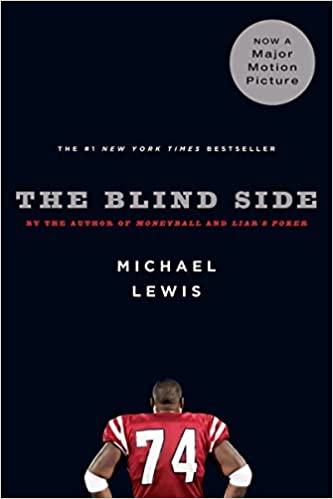
The third piece is my favorite one because it gets engineering buy-in. Engineering, as you know, is often the hardest critic, the hardest folks to win over with an SEO initiative. We can get all of the benefits of the SEO program for just 20% of the engineering effort you have historically been putting in because we will identify the 80% of things that are not worth doing. They’re either negative or neutral or don’t bring enough uplift to justify the maintenance cost.
You will now not have to implement those tickets. Eighty percent of your engineering tickets from SEO disappear. You can put that effort into something more exciting, like what engineering wants to do, some product initiatives, etc. We will still benefit from the SEO program with 20% of the engineering.
That’s cool. That reminds me of something I learned from Perry Marshall. He’s big into the 80/20 rule, the Pareto principle. That is that the Pareto Principle is fractal.
That’s because you can drill into the 20%.
Yes, there’s an 80/20 of the 80/20. So if you think of it in those terms, 5% of the things you do will drive 54% of the value, something like that, that’s the first order.
20% of the 80%.
Yeah, the first drill down of the 80/20. Have you heard that before?
I haven’t heard that, but I remember Perry Marshall from years ago. It doesn’t surprise me because that’s basically what we see. That’s how we’re building out those business cases. It’s really powerful for marketing leaders to be able to tell SEO stories the way they’ve always been able to do about digital media.
You pioneered this as well, but you used to have per-click pricing for SEO if I remember correctly. There’s a ton of power in that. The briefest of a plug, since we’re on a podcast and people listen to podcasts, like other podcasts, I am launching a podcast at SearchPilot.
We will be launching the Business Class Lounge, which is me interviewing marketing leadership, so CMOs and marketing VPs, about all kinds of things, leadership, management, finance, budgeting, forecasting, and a little bit of SEO, but not SEO-focused. So many of them don’t have an SEO background.
Neglecting the importance of exact phrasing can have disastrous consequences, leaving a website’s organic traffic plummeting by as much as 20% or 30%.
I want to spend time understanding how effective marketing leaders already think about our channel because we spend too much time, heads down, in the channel. I love that too. I’ll geek out all day, but I’m interested in the leadership side.
That’s great. Welcome to the podcasting world. I’m excited to have you join as a podcaster. There are some great podcasting conferences.
Let’s see how far down this will end up as well.
The pod fest and podcast movement, and there are some great conferences. Regarding the fractal 80/20 rule, I just looked it up. Its 4% contributes 64%. Masterminds, meetings, communities, online training, what are your favorite SEO resources that are not your events or your products?
Great question. Regarding events on each side of the Atlantic, I’ve always enjoyed MozCon. We were involved in the early days of the thinking. There are a lot of similarities between MozCon and SearchLove in terms of the single track, in terms of the focus on advanced keynote-level sessions, and those kinds of things.
I also love BrightonSEO, this side of the pond—a ton of respect to Kelvin Newman. I always loved what he’s done. So those are the two that I’ve spoken at most recently that aren’t our events. But, like you, I like going to things when I’m speaking, but then I only talk about something where I’d like to attend the event, so it works out pretty well.
In terms of reading, it’s interesting. My reading habits have changed. I used to subscribe to specific blogs and those kinds of things religiously. These days, it’s much more Twitter-centric. I have a private Twitter list that I follow of more industry folks.
I hope Elon Musk doesn’t screw Twitter up because I liked Twitter. So that’s where I get a lot of that. And then some private communities, Slack groups, WhatsApp groups, and those kinds of things.
I get the most value from our internal stuff. It’s always been the interior company, and nobody else can join this and trade unless you want to work; it’s fine. We’re
That’s great. What about mastermind? Have you ever considered or been in a mastermind? For example, I’m in Genius Network, M.E.T.A.L, and have done Strategic Coach for a few years and Abundance360 for a few years.
I’m a part of a group called Hampton, founded by a podcaster, Sam Parr, who founded The Hustle (I think) that’s sold to HubSpot. So I get those connections right. I’m not sure.
Anyway, It’s not SEO-centric. Most of those kinds of groups that I’ve been a part of have been more founder-, entrepreneur-, or business-centric rather than technical knowledge. That’s the biggest area of development that I’m working on personally.
Yeah, I just googled it, and you’re correct. HubSpot did acquire The Hustle.
I thought I got it. It was like, that was connecting.
I’m good at googling stuff in real time. So I wrote a book about that called Google Power Search.
All right, awesome. If our listener wants to follow your thought-provoking insights and analyses, you’ve got your blog and your own Twitter. Are you most active on Twitter yourself?
Yes. Until Elon drives it into the ground, it best to catch me on Twitter, @willcritchlow, and we’re @searchpilot. I’m mostly writing these days; it’s on searchpilot.com. We have a SearchPilot blog there. I do a little on LinkedIn, so people should feel free to visit LinkedIn, too.
Awesome. Thank you, Will. Thank you, listener. I hope this inspired you to think outside the box and invent or innovate because the world needs you. We’ll catch you in the next episode. I’m your host, Stephan Spencer, signing off.
Important Links
Connect with Will Critchlow
Apps and Tools
Articles/Newsletters
Books
Businesses/Organizations
People
Previous Marketing Speak Episodes
YouTube Videos
Your Checklist of Actions to Take










About Will Critchlow
 Will Critchlow is CEO of SearchPilot, a company that spun out of Distilled, which was acquired in 2020. SearchPilot is an enterprise SEO A/B testing platform that proves the value of SEO for the world’s biggest websites by empowering them to make agile changes and test their impact.
Will Critchlow is CEO of SearchPilot, a company that spun out of Distilled, which was acquired in 2020. SearchPilot is an enterprise SEO A/B testing platform that proves the value of SEO for the world’s biggest websites by empowering them to make agile changes and test their impact.







Leave a Reply